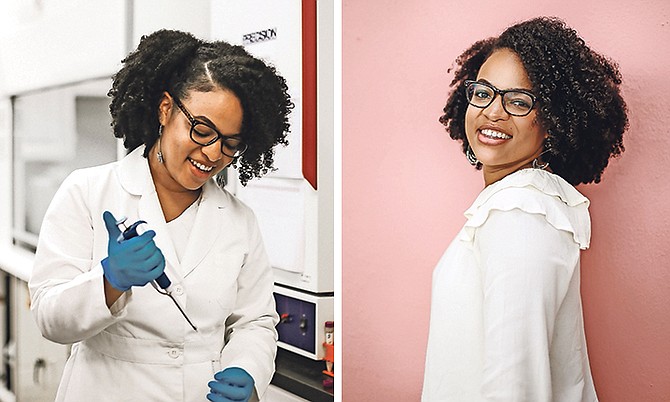Bahamian Nicole McCardy found her calling her in the lab and now helps develop new products for a major US company. (Photos/Grace Weimer)
By JEFFARAH GIBSON
Tribune Features Writer
jgibson@tribunemedia.net
The next time you pick up a cream or ointment from your local drugstore you may be purchasing a product that was developed by a young Bahamian woman who has found herself on the cutting edge of cosmetic manufacturing.
Nicole McCardy was the kind of consumer who thoroughly read the labels of cosmetic products to see if the ingredients were a good fit for her skin before buying them. And having some knowledge of chemistry, she decided to take things a little bit further by finding her own natural remedies to address her needs, including issues with acne.
Researching and coming up with alternative formulas sparked a fascination with chemistry in Nicole, so much so that she decided to pursue a career in this field. However, the exact path took some figuring out.
“I studied chemistry as my major in undergrad. I have always had an interest in products and would read the backs of bottles to understand what was in certain products. I also dealt with acne issues and would find natural remedies that I would make to help with this,” the 26-year-old told Tribune Woman.
Nicole went on to earn a Bachelor of Arts in Chemistry and a Master’s degree in Pharmaceutical Science with emphasis in bio-membrane. Today, she has found herself in a very rewarding career as a formulation chemist at Dermazone Solutions in St Petersburg, Florida.
“When I told one of my professors about what I liked, she recommended this field to me. She helped me look into graduate schools offering programmes in the area and even drove me to visit one about three hours away. I actually ended up applying to that school and received a full ride plus a stipend to attend. My professor was very influential in my decision to become a cosmetic chemist,” she said.
The company Nicole works for specialises in cosmetic and pharmaceutical development and manufacturing. It develops cosmetic, over-the-counter and prescription products for topical use.
Dermazone carries their own line of high-end cosmetics called Kara Vita and also acts as a contract manufacturing organisation.
“My official title is formulation chemist II for the research and development department. We specialise in a variety of topicals, but we also have worked on medical devices, nutraceuticals (products derived from food sources with extra health benefits),” she said.
“My day can vary, but I tend to have specific projects with products that I am developing. For example, some of my projects include a topical and consumable CBD (cannabidiol) products and a prescription salicylic acid cream. Developing a product can consist of a variety of tasks such as sourcing compatible materials, running tests, stability studies, conducting a study, and writing batch records for the manufacturing and production team. “
Nicole now has insider knowledge of how the products are made that are daily used by millions of women around the world on their skin.
“At my company we will take a product straight from conception to manufacturing and filling. Our tanks can make as much as 3,000 lbs of products. This amount of product can fill between 3,000 to 48,000 units depending on the size of the fill. Being in research and development, I help with the scale-up of a product from the lab to the production lot to help ensure the products’ integrity,” she explained.
And product integrity is very important, the young chemist noted.
“Making a pound of product is very different to making 3,000 pounds. Products such as these go through so much safety and efficacy testing before they ever hit the production lot. To launch a product can take years of development,” she said.
“I have learned quite a bit being in this industry. For one, there are a lot of the botanicals and extracts in skin care products are not at the levels where the claimed beneficial activity is actually seen.”
As a word of advice to consumers, Nicole suggests taking on her habit of paying close attention to the labels.
“Typical brands will sprinkle a little in the formula just to have it on the label. Ingredients for cosmetics are typically listed in condescending order, and any ingredient that is less that 1% can be listed in any desired order at the bottom. You can figure out what is less than 1% of your formula by looking at any ingredients under ‘fragrance’. Everything below this should definitely be less than 1%,” she explained.
Nicole loves sharing her knowledge and hopes to do so more in the future through social media channels.
“I love what I do I want to somehow share this with the world. I am currently working on a blog and want to start up a YouTube page where I prep formulas at home and teach the basics of formulating. I desire to have my own hair care company one day, centered around curly hair products. I would love to utilise Bahamian ingredients in my products. Perhaps one day soon you will see my product in a store near you,” she said.
“I see myself growing and becoming a manager or a lead scientist to a research and development team. I also see myself as one day having my own company.”





Comments
Use the comment form below to begin a discussion about this content.
Sign in to comment
Or login with:
OpenID